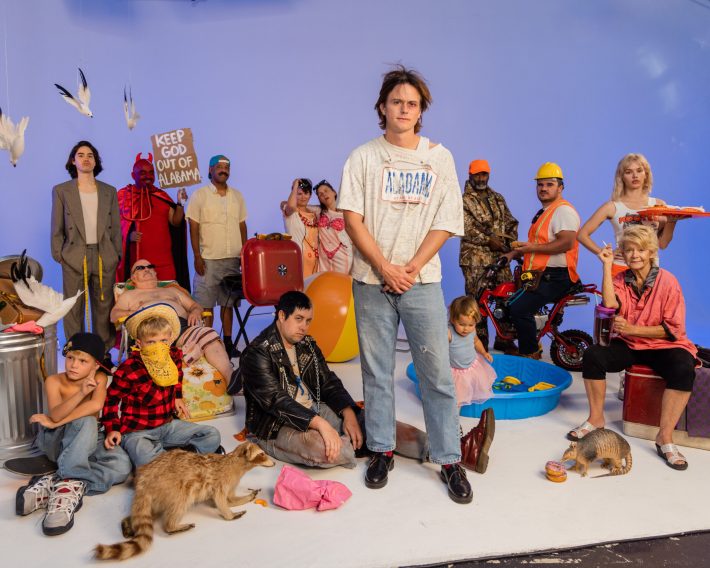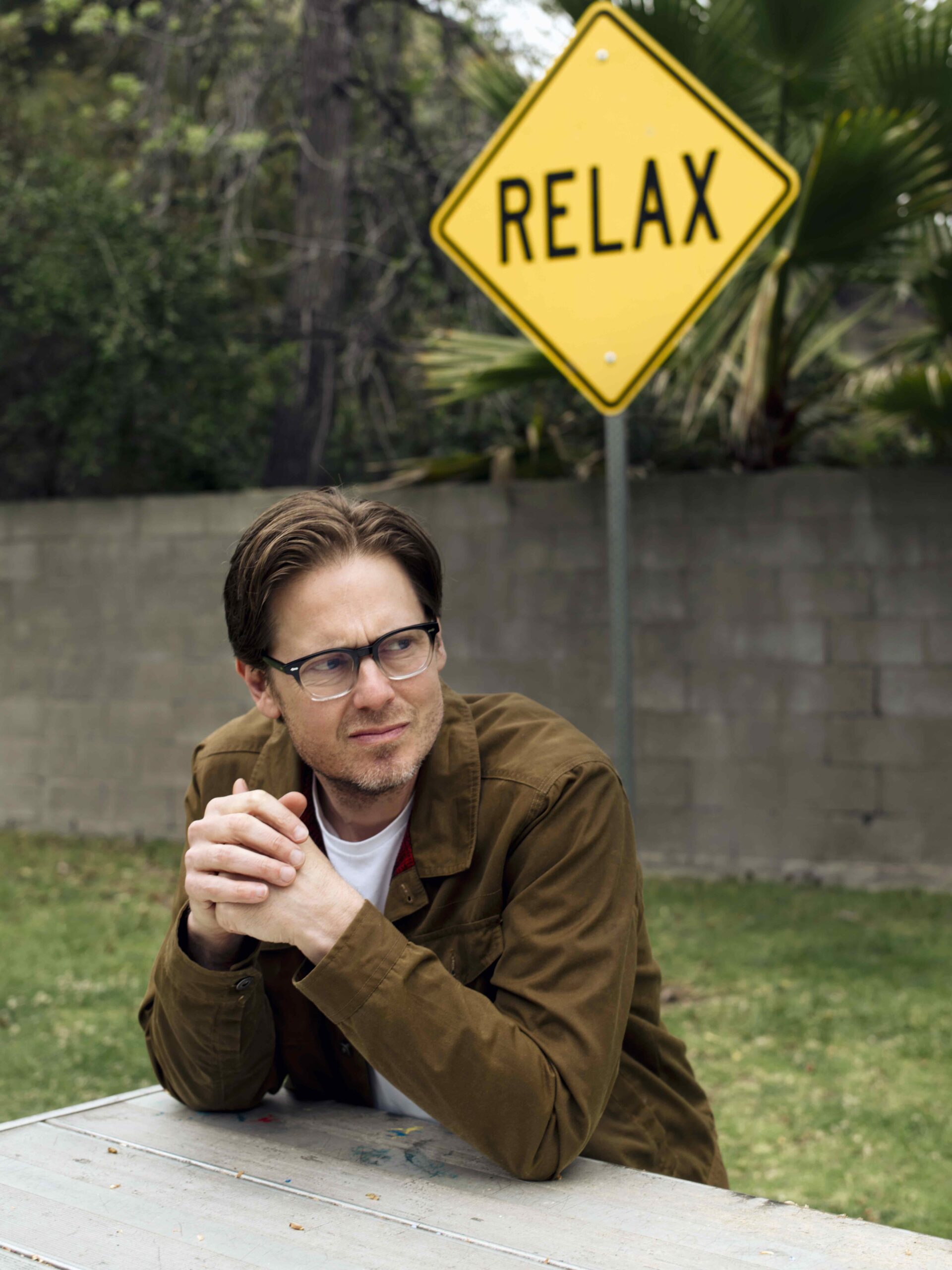Professional funny people Tim Heidecker, Frak The Person, and Whitmer Thomas on the fine line between musical comedy and music by comedians
Tim Heidecker had been releasing music for years before he had his musical breakthrough in 2016 with In Glendale, an album inspired by the birth of his daughter, a familial move to the LA suburbs, and the midlife mental adjustment that came with his 40th birthday. You'd be forgiven for thinking all of those experiences fit more naturally as material for a standup set, but the hugely successful comedian and writer wanted to use it to fuel his other artistic passion and to challenge his perception among audiences.
"I had spent 10 years in this kind of ironic cocoon, a protective armor of not being myself, not being genuine in the way I projected myself publicly," Heidecker says. "I started with music as my first love, because comedy seemed to be impossible to actually do. I was such a fan of it, I loved being funny, but I didn't know any way to actually do it."
In Glendale kicked off a stellar musical run for Heidecker, one that included six more acclaimed folk rock-tinged studio albums including October's Slipping Away, shows with Waxahatchee and Father John Misty, and an increased level of genuine vulnerability that we may not have expected from the guy who brought us Dr. Steve Brule and fictional swamp rock group Pusswhip Banggang. Music has long been a part of Heidecker's comedy work; he's released music with Eric Wareheim in connection with Tim And Eric Awesome Show, Great Job! But even though there's a little goofiness to his solo tracks like "Hey, Would You Call My Mom For Me" and "Work From Home," they're a far cry from 2008's "I Sit Down When I Pee" and "Wipe My Butt."
"It took me 'til my early forties to have the confidence and the experience and perspective to attempt some actual songwriting that isn't just satirical or ironic or made for comedy," Heidecker says, acknowledging that some of his comedy fans have musical interests quite different than his "'70s inspired dad rock."
There's an important, albeit enigmatic line that we need to define here – the one between musical comedy and music by comedians. The majority of the sonic output from folks like Adam Sandler or Awkwafina has a more overt comedic bent than the music released by Heidecker, Hannibal Buress, comedian/actor Whitmer Thomas, or rapper/comedian/improvisor Frak, a new cast member on Wild 'N Out. (His fellow cast member DC Young Fly is another celebrity who has a serious musical component to his career that's usually quite separate from his comedy and acting.)

A native of the Bay Area, Frak describes himself as a natural "class clown," but says his serious passion for hip-hop developed as an adolescent, peaking with an opening slot for Travis Scott as a 14-year-old. Initially, he branded himself as "Frak The MC," but broadened that to "Frak The Person" in order to encompass his comedic work. Frak cut his teeth in the battle rap scene, bringing humor to the medium, including a viral moment where he rebuked an opponent's COVID denialism with a printed graph and brought a backup copy, anticipating that he'd rip it up. But for all of the funny moments he creates, Frak takes his actual musical output incredibly seriously, even if he's dropping a few funny punchlines. Frak reserves his overt humor for Wild 'N Out, where he was a freshman standout, as well as social media skits including "Barry The Barsplainer," a dead-on parody of the reaching analysis that's become common with hip-hop tracks online.
"There's a stigma around humor in music, whether it's parody like Weird Al, or even someone who I get compared to a lot like Lil Dicky. I think there's a big difference between our music," Frak says. "I think Lil Dicky is intentionally making satirical [songs]. You could put them under the genre comedy, and my songs have funny moments, but they're not [comedy]."
While Frak releases his music through a small Bay Area-based label called Wav.House, Heidecker and Thomas have parlayed their success into releasing music through well-known independent labels like Spacebomb and Hardly Art. These affiliations come alongside a consistent emphasis on working with well-regarded collaborators, from Frak's music with Del The Funky Homosapien to Thomas' work with Jay Som to Heidecker's time with indie production stalwart Jonathan Rado of Foxygen. Heidecker cites working with his touring band in the studio as a major turning point, one that has brought out the best of his musical creativity. He would love the chance to tour a record live for a year and then go back and remake it — a practice he admits is, practically speaking, "totally useless" in music, but clearly seems to be rooted in the more adjustable nature of a standup set.
For Thomas, music was similarly his first passion, and something he initially pursued before his band in LA, which he says received a "very thin offer by some screamo record label," actually transitioned into a sketch comedy group. He'd put music on the backburner for more than half a decade, but dove back in unexpectedly when a comedy show he was participating in asked him to "write a song advertising what it's like to go out on a date with me." From there, Thomas began to consider how he could marry the two passions, though he talks about his first public attempt – his breakout 2020 special The Golden One – with some sheepishness.
"I was like, these are sort of songs that are very front-facing comedy songs, and if I sing in this funny voice right out the gate, an Ian Curtis kind of voice, then people will immediately start laughing. I don't sound like that," he says. "But then when I got on stage to film my special, I realized how stupid it was that I was singing in that dumb voice, and I was like, 'Oh, shit, I've committed to this. I'm never doing it again.'"
Thomas' subsequent music does have a wryness to it,but it's certainly played straighter than what he did with Golden One. He's found a niche in the crowded indie rock scene as a clever, candid songwriter in the vein of David Berman or Phoebe Bridgers.

Both Thomas and Heidecker tend to make albums that have cohesive concepts, the kinds of ideas that could easily be the premise of entire standup sets. With Slipping Away, Heidecker explores quotidian anxieties with an apocalyptic undertone, and his 2019 LP What The Brokenhearted Do… covers love and heartbreak as a result of a fictitious social media rumor that he was getting divorced. Thomas examined his own upbringing with The Older I Get The Funnier I Was, and on The Golden Ones reflected on the passing of his musician mother due to alcohol issues.
Platforms like TIkTok have been a boon for these sorts of artists, who often use social media to gain attention with overtly comedic music and skits in the hopes of drawing an audience to their more earnest art (i.e. Carter Vail, PeteyUSA). In today's musical climate, one where streaming royalties are minimal and tours often break even at best, there's a logic to creative people diversifying into multiple avenues.
"It's much harder to make a living as a musician, and I love all these things, music, movies, comedy, and sometimes I wish I could just do music. I love being in the studio," Thomas says. "And then it goes between all three and you've got to make a living. So I'm happy to do all three and do any of them whenever I'm needed." Buress has expressed similar sentiments, telling NME in 2023 that his focus on his rap persona Eshu Tune came about because he felt a malaise with standup and film: "I was just doing music and there was no money in it. That's what indicated that I needed to focus on music because that's what was really true."
In a world of Bo Burnhams and Cat Cohens, there's always going to be a level of surprise when someone expresses that they are both a comedian and a musician, not a comedy musician. But artists like Frak, Thomas, and Heidecker (whose current tour for Slipping Away is his most ambitious yet) are challenging the preconceived notions that you can't be this particular kind of multi-hyphenate, taking part of your work incredibly seriously and part of it not so seriously at all.
"I'll always identify as a standup comic before anything. [When] somebody asks me what I do, I say, 'I'm a comedian.' And then they'll see me with a guitar and they'll be, 'Why do you have the guitar?' I go, 'I do music too,'" Thomas says. "And they go, 'You do musical comedy?' And I'm like, 'Eh, not really. I don't play any funny songs.'"
We rely on reader subscriptions to deliver articles like the one you're reading. Become a member and help support independent media!






